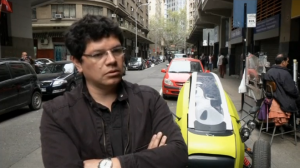

Soki, Chile’s first electric car set to be widely available in the South American country, whizzed through the streets of Santiago on Saturday (September 26), attracting the attention of curious bystanders.
The two-seater vehicle, named after an indigenous word meaning ‘two’ from the now extinct Selkham tribe from Patagonia, can run for up to 60 km (37 miles) and has a price tag of approximately $12,000 USD.
Daniel Pavez, one of the car’s creators, explained how the idea was to make a vehicle with the comfort and safety of a traditional car but also incorporating the advantages of other forms of transportation such as a motorcycle or bicycle.
“I made this part from personal motivation but later it turned into a technical challenge that we tried to resolve with the inclusion or the development of a concept of transportation that tries to provide in the same product, the same sense of safety and comfort that you find in a car [traditional car] with the agility of a motorcycle and with the efficiency of a bicycle, and trying to make it very economical,” he said.
Soki runs on a battery that can be charged in three hours and was designed by VoZe EV, a company created by Pavez, an industrial mechanic.
For Pavez, what sets the vehicle apart from similar models is its practicality in urban settings.
“What motivates us is the power to create a model offering a different value. So the value proposition, I think, is the main difference. There are other vehicles with three wheels in this style but they don’t have the same characteristics as this one, which make it more practical when it comes to considering the model for use in a city,” he said.
“It is a largely urban vehicle, as such the speeds, the capacities, and everything involved in the technical aspect are designed for urban use,” he added.
The car is to be available for purchase by March 2016 and was developed with support from Chile’s Production Development Corporation (CORFO), a governmental organization that promotes economic growth in the country.
CORFO’s Innovation Manager, Patricio Feres, commended the vehicle as a potential transportation solution for densely populated cities.
“These are challenges that are going to continue to grow, especially in densely populated cities. So they, (car creators) like to highlight this project because they have proposed a solution, as I was saying, that is clean, that is efficient, and also has high standards of comfort and security,” he said.
Over the next few weeks Soki and its team of creators will participate in an 11-city tour to show off the sleek little machine throughout the country. (Reuters)
